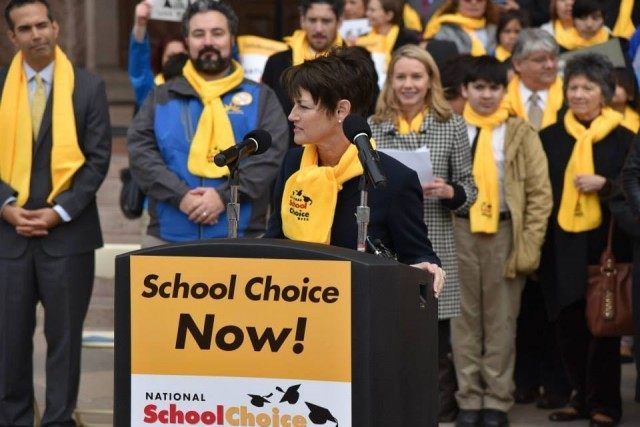An estimated 4,000 Texans are expected to rally in Austin today to show their support for expanded school choice during National School Choice Week. They will bring their message to the south steps of the Capitol building.
Governor Greg Abbott and Lt. Governor Dan Patrick, the state’s top school choice proponents, will speak at today’s rally. The event begins at 10 a.m. with a march on south lawn at the Capitol followed by the annual rally with more than 20 other Texas elected officials.
Abbott proclaimed January 22 through January 28, school choice week in Texas, reaffirming his commitment to “support families’ ability to choose the educational environment that best suits their children’s needs.” In 2015, he underscored the relevance of a parent’s role in a child’s education. Last year, he signed a school choice week proclamation highlighting the importance “for parents in Texas to explore and identify the best education options available to their sons and daughters, as research demonstrates that providing children with multiple education options improves academic performance.”
Organizer Randan Steinhauser called this year’s rally a “reminder to our legislators that parents in Texas want more education freedom.” She said: “The demand for more school choice is widespread and it’s time for Texas to join the growing number of states that allow parents the opportunity to choose their child’s education.”
While Texas already offers school choice options like magnet and public charter schools, plus private and home schools, lawmakers hope to expand access for the state’s K-12 children through legislation that would create an education savings account (ESA) program.
In 2016, the Lt. Governor made the case for ESA’s in a series of Texas Conservative Coalition Research Institute (TCCRI) policy summits on education choice held around the state. It featured panels of state legislators who support this kind of school choice plus Steinhauser and others who promoted ESA’s allow parents to have more choice in their children’s education, particularly for children stuck in a failing public school.
Roughly 5.3 million children attend pre-K through grade 12 in one of the state’s 8,000-plus public schools. The 2017-18 Public Education Grant (PEG) program listed 1,379 struggling campuses, inching down from the even higher 1,532 failing schools on the 2016-17 PEG list. According to the Texas Charter Schools Association, 129,589 students were on charter school wait lists in 2014.
Proponents say school choice affords children access to educational settings that best fit them while empowering their parents to become more involved in the education process. U.S. Senator Ted Cruz called school choice “the civil rights issue of the 21st Century” in 2014. He supports universal ESA’s.
In September, Daniel Garza, president of the nonprofit Libre Initiative, spoke at a Dallas-held TCCRI summit in support of ESA’s and other similar tax credit scholarships and savings grant programs. He said they provided more educational opportunities to Texas’ Hispanic families. Garza cited the Opportunity Scholarship Program (OSP), a Washington, D.C., K-12 private school student voucher program for low-income children, which he maintained had a 91 percent graduation rate, 30 percent higher than their public school peers.
At press time, ESA legislation was not filed yet but the issue already stirred up strong opposition from the state’s teacher unions and associations. They assert school choice undermines traditional public schools by diverting public taxpayer dollars away from their coffers, are not held to the same accountability standards, and are not unionized. Lobbyist organizations like the Texas Association of School Boards (TASB) vow to stop vouchers. The Texas Association of School Administrators (TASA) stand against school choice programs. TASB/TASA also balked at the state’s new public school A-F accountability ratings system. Advocacy groups like Texas Kids Can’t Wait only support public schools; Raise Your Hand Texas also opposes school choice.
Some homeschool parents also have expressed wariness of ESA’s fearing that privately funded school choice will have “strings attached” and bring government intervention and regulation that will impact the state’s hard-fought for homeschooling liberties. As one parent told Breitbart Texas, “I love the idea of ESA’s, I just want to make sure we don’t lose freedoms we now enjoy (because of them).”
Event organizers include Texas for Education Opportunity, LIBRE Initiative, the Texas Private Schools Association, Texas Homeschool Coalition, Texas Charter Schools Association, Texas Public Policy Foundation, Texas Catholic Conference, ResponsiveEd, Families Empowered, Public School Options, Aspire Texas, EdChoice, Texans for Education Opportunity, Americans for Prosperity – Texas, The Justice Foundation, Agudath Israel, Texas Business Leadership Council, Texas Association of Business, Connections Academy, Institute for Justice, and the Texas Conservative Coalition.
National School Choice Week is a nonpartisan, independent public awareness effort to raise public awareness about educational choices available to children such including traditional public schools, public charter schools, public magnet schools, online learning, private schools, and homeschooling. The first National School Choice Week, in 2011, consisted of only 150 events.
Tuesday’s Austin-held rally is one of 21,392 nationwide events, including 1,593 in Texas, to promote school choice over a week that kicked off on Sunday, January 22, and runs through Saturday, January 28.
Follow Merrill Hope, a member of the original Breitbart Texas team, on Twitter.
This article has been updated.

COMMENTS
Please let us know if you're having issues with commenting.